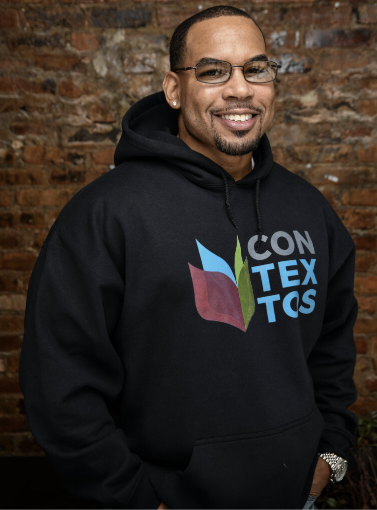Spankey Davis is the Senior Alumni Advocate for ConTextos, a Chicago non-profit that uses education and personal narrative to promote healing, reflection, and social change.
In describing ConTextos, the non-profit where he works, EJP alumnus Spankey Davis says, “We are a harm reduction organization that uses art and literature as therapeutic tools to help young people work through their trauma.” ConTextos engages youth 16 – 24 in topical discussions designed to empower them to trust themselves and pursue their personal goals.
Workshops are conducted in Chicago public high schools, Cook County Jail, youth detention and community center sites throughout the city of Chicago. Participants’ poems, stories, and memoirs are compiled into publications available from the ConTextos website.
Young people who have participated in the program are considered alumni, and as senior alumni advocate, Spankey works with them to help them achieve their goals, whether that’s going back to school, continuing their art or writing, or finding housing and employment.
Spankey is also an EJP charter student, part of the very first cohort from 2008. Once released from the Illinois Department of Corrections in 2021, he moved quickly: “When I came home, I hit the ground running. I used the relationships and resources that I’d built [while inside] to… do the work I’d been preparing myself for over the entirety of my adult life while incarcerated.”
For Spankey, that work centers on community building for underserved populations. Since his release, Spankey has worked for a range of Chicago organizations devoted to violence prevention, restorative justice, and reentry initiatives. He started working for a housing justice non-profit in Evanston called Open Communities. His initial position was as a housing counselor, but he was quickly promoted to outreach and compliance coordinator. Along the way, Spankey learned about the challenges people with convictions face when trying to find housing: “I learned that there are no federal protections for people with criminal histories. Formerly incarcerated individuals are not part of the federally protected classes, so you can legally discriminate against them.”
The job with Open Communities prepared Spankey to become a case manager with the Precious Blood Ministry of Reconciliation, a social services and restorative justice organization serving people impacted by violence and the criminal legal system. He worked there for approximately a year before receiving his current position with ConTextos.
At the heart of Spankey’s work in serving and supporting people who face intersecting societal disadvantages is a sophisticated understanding of how empowerment works.
“The more you know an individual, the better you can assess how to empower them to achieve their goals,” he says. “Serving a community is about knowing a community, it’s about building relationships with them. If you don’t do that, then you might assume your sense of what they need is sufficient to govern how you go about serving them. That is almost always mistaken…we can look across history and see well-intended people trying to serve communities from the powers of their own lights, without recognizing the power of light in the community they’re wanting to serve. We don’t want to repeat that.”
Spankey says that the attitude and relational framework he brings to his work is inspired by EJP’s distinct ethos. He remembers: “[EJP instructors] were interested not only in our intellectual lives; they were interested in our holistic lives…They wanted to understand how education and the intellectual life would also apply to our lived experience. They began to take an approach that was more like an empowerment and a partnership, where they would learn from us and, based upon the process of that learning, they would empower us to see them as partners in this educational process. It wasn’t just them pouring into us; we were also pouring into them.”
During summer 2023, Spankey plans to further develop partnerships with Chicago organizations that serve young people, as part of his work with ConTextos.
He is also going to be pursuing some personal interests: “I’m only two years out, so I’m still rediscovering the city, I’m still rediscovering these communities, and all the ways things have changed. I’m still rediscovering fun things to do.
“In my personal life, I’m looking forward to getting my passport. I really want to go to the Greek islands, like Mykonos or Santorini. I want to go to the Maldives, Tel Aviv…I want to visit the south of France, Monaco, some of the very nice and exclusive places in Europe. And you know, I want to go to the continent, and, as an African American, just connect to the beauty and historicity of my birthright.”

